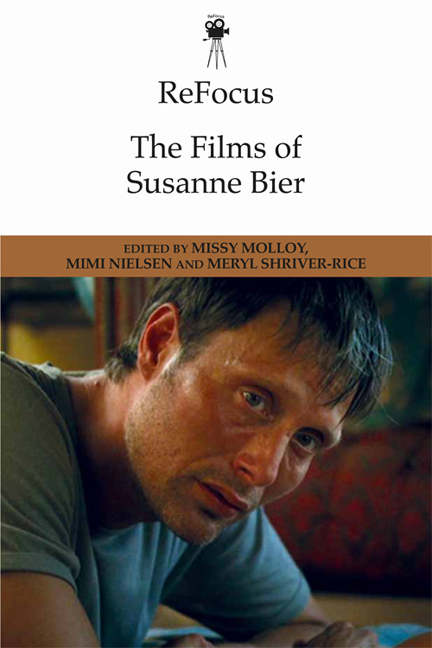Book contents
- Frontmatter
- Contents
- List of Figures
- Notes on Contributors
- Foreword
- Introduction: Susanne Bier's Boundary-Crossing Screen Authorship
- Part 1 Generic and Industrial Fluidity
- Part 2 Negotiating Identity
- Part 3 Authorship and Aesthetics
- Part 4 Transnational Reach
- Postscript: A Conversation with Susanne Bier
- Filmography of Susanne Bier
- Acknowledgments
- Index
1 - Storytelling Schemes, Realism, and Ambiguity: Susanne Bier's Danish Dramas
Published online by Cambridge University Press: 01 May 2021
- Frontmatter
- Contents
- List of Figures
- Notes on Contributors
- Foreword
- Introduction: Susanne Bier's Boundary-Crossing Screen Authorship
- Part 1 Generic and Industrial Fluidity
- Part 2 Negotiating Identity
- Part 3 Authorship and Aesthetics
- Part 4 Transnational Reach
- Postscript: A Conversation with Susanne Bier
- Filmography of Susanne Bier
- Acknowledgments
- Index
Summary
Susanne Bier is part of a movement in New Danish Cinema beginning in the 1990s that explored genres other than popular folk comedy and engaged with realism and art films, transforming traditionally episodic narratives into a tight dramaturgical form. In this historical context, Bier made a modern and very popular comedy, The One and Only (Den eneste ene, 1999); she embraced central elements of realist art films with Open Hearts (Elsker dig for evigt, 2002); and she made a potent drama with melodramatic features, Brothers (Brødre, 2004). As such, she epitomizes this movement in Danish cinema towards tight narrative structures across several genres and modes. A surprising number of these films have travelled across borders due to a combination of their generic and narrative features and national peculiarities making them comprehensible yet evocatively different to an international audience.
This chapter will focus on five of Bier's Danish dramas. In this context, ‘drama’ is broadly defined as films about intimate relations in conflict presented in a serious or mainly non-comic manner. Even though her dramas have been successful with audiences and have received a series of nominations and awards, it is not unusual to find critiques of these films that scorn their schematic structure (Sklar 2011) or mock them as “compassion porn” (Taylor 2011). Whether or not one agrees with such judgments, there is no doubt that Bier strives to maximize contrasts and character dilemmas in order to enhance the emotional impact on audiences. This has placed her films within the categories of the melodramatic and the popular. Yet the schematics of the narrative macrostructure such as sudden reversals, unsolvable dilemmas, stark contrasts, and extraordinary moral challenges combine—as I will demonstrate—with realism and art film.
Therefore, Bier's dramas are not melodramas only. Films such as Open Hearts, Brothers, After the Wedding (Efter brylluppet, 2006), In a Better World (Hævnen, 2010), and A Second Chance (En chance til, 2014) sustain a particular tension between the macrostructures of melodramatic storytelling and a realism anchored in a psychological intimacy with characters and the trivialities of family life. Furthermore, these interactions between melodrama and realism are systematically embedded within an ambiguously subjective as well as a “supra-diegetic” level that belong to an art film mode.
- Type
- Chapter
- Information
- ReFocus: The Films of Susanne Bier , pp. 19 - 35Publisher: Edinburgh University PressPrint publication year: 2018



